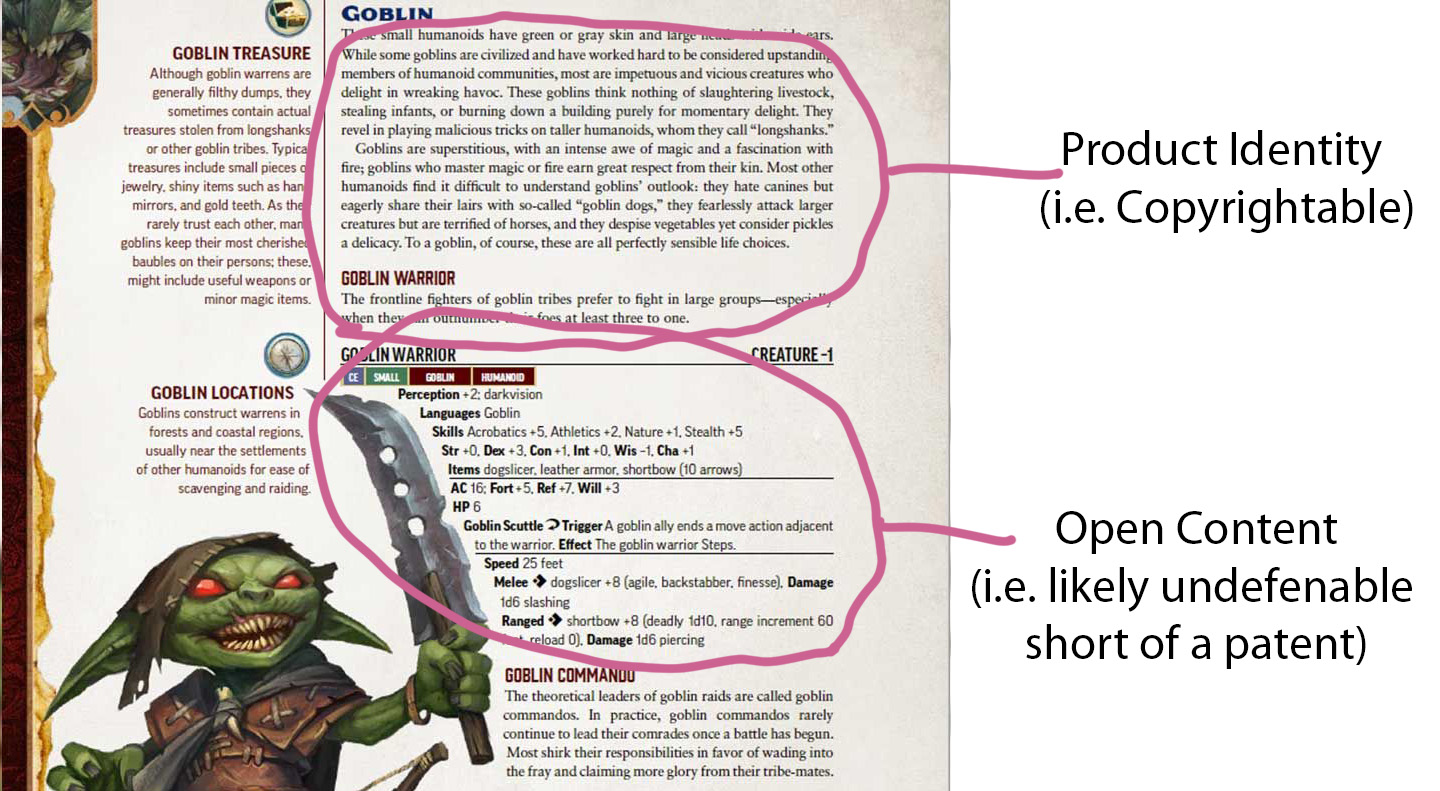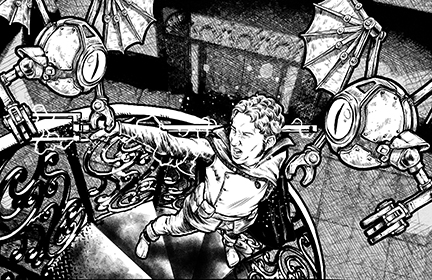Last time I talked a bit about real vs. fictional death and outlined some of the ideas that were floating in my head when I designed the Delve death and dying rules. This time around, I’m going to share those rules and illuminate more of what they’re meant to accomplish. Fair warning: we’re going to get crunchy and loud!
Before we get into the meat of the subject, let me first remind you of some of the core attributes of the game. To do so, here is the attribute knot of the 2nd-level version of my iconic wizard, the halfling Geldon Brightbrow.

Like most things in Delve, this will seem both strangely familiar and familiarly strange, but let’s take a walk-through.
At the core of the knot are the six attributes. There are three physical attributes and three mental attributes. The physical ones are Agility (Agi), Athletics (Ath), and Endurance (End), which sit on the left side of the knot. Two of those, Agi and End also feature defenses (the attributes that hover a bit outside the central knot are in shield-shaped boxes and are typically derivatives of the parent score +10, sans any itemization, magical effects, or situational modifiers). At the right side of the knot sit the mental attributes: Awareness (Awa), Charm (Cha), and Knowledge (Kno). Of those three, Awareness features a defense calculated in the same way as the other defenses.
Speed is determined primarily by your race and is the maximum movement you can take in squares (roughly either 5 feet or 1.5 meters) or the maximum number of leagues you can travel by foot each day.
Armor is a mix of either Agi or End plus the armor you wear.
Heroics is one of three pools within the attribute knot and is based on Charm. Essence is also a pool and is based on Endurance. At the center sits Hits, the third pool attribute, and that is based on your race, class, level, and Endurance and determines the amount of punishment you can take.
There is one more minor attribute that sits in another section of the character sheet called Carrying. It’s your Athletics +10 and it how much stuff you can carry without affecting your Speed and your defenses.
Anytime you do something, or someone tries to do something to you, these numbers are the core or your character. You want to swing a sword, you roll a d20 and add your Athletics. To see if you succeed in wounding your enemy, your resolution roll better be equal to or greater than its Armor. You want to lie to a fella, you roll a d20 and add your Charm. For your lie to be successful, your resolution roll needs to be equal to or greater than the fella’s Awareness Defense.
Aside from talents, spells, items, and circumstances, attributes determine what exactly your character can do and how it’s affected by other actors in the game.
With all that out of the way, and before moving on to death and dying, we are going to take a refresher course in Heroics, and the Heroic Save, as they are essential ways to avoid getting to that point in the first place.
Heroics is a pool of points that allow you to perform genuinely heroic acts. Unless you’re the Delve Master, you’re going to be playing a character in the game. Characters are typically the only actors in the game that gain the Heroics attribute. There are exceptions, of course, and there is a corresponding Villainy attribute for really badass fuckers, but more on that some other time.
Characters also start with three Heroic talents. The first is Heroic Surge. This one talks to the initiative system in Delve. If you have at least one Heroics in your pool, you can use it as a reaction at the start of the round and go before the bad guys (unless they have a Villainy and choose to use a similar ability).

The next is the Heroic Save. It allows you to spend Heroic points to ignore an effect. It’s powerful, but with diminishing returns. Do it too much, and you’ll be caught with your pants down and lose the use of other Heroic Talents.

The last is the Heroic Sacrifice talent. We’ll come back to that one in a bit. It’s a doozy and talks directly to death and dying.
Of course, as you increase in level, you can pick up other Heroic talents, but that’s a talk for another day.
Got it? Good. Here we go. As you might suspect, when you get hit by a weapon, spell, or some other effect, you’re going to take damage. When you do, you reduce the number of Hits by an amount equal to the damage. When you reach 0 Hits, the fun begins.
So, the first thing to keep in mind is that in Delve, no attribute is ever reduced to fewer than 0. Be that Hits, Endurance, Heroics, or any situational penalty to your attributes, so no messing about with negative numbers.
Okay, with that out the way, as a living creature, when you first reach 0 Hits, you fall prone, you are dying, but you’re still conscious. You can still do some things. I call this dramatic dying. But, while you are dying, you are vulnerable (i.e., you take a -2 penalty to Agi, Ath, End, and Awa, and you open yourself up to some special effects) and you run a higher risk of becoming dying and unconscious. You become dying and unconscious when you are dying and conscious and take an amount of damage equal to or greater than your Endurance or if you finish an Attack or Risky action. When you’re unconscious, you can’t act. If you’re dying and unconscious, you die if you again take damage equal to or greater than your Endurance.
What happens if you are dying and unconscious for an extended period? That’s entirely up to the Delve Master. Based on the situation of your dying and why you were left alone, they can decide that you die after a certain period or that you somehow recover.
How do you get out of this shit? Get healed enough by an amount equal to or greater than your Endurance. Doing so, when you are dying, and conscious brings you to a number of Hits equal to the amount of healing you received. Doing so when you’re dying and unconscious makes you dying and conscious. It does jack shit when you are dead. But most of the time, getting healed reduces your Essence (after you gain the healing, of course), and all of what I’ve said before supposes that you have at least one Essence. If you’ve spent all of your Essence and you reach 0 Hits (or you at 0 Hits when your Essence is reduced to 0), you die. Plain and simple. And there’re plenty of stresses on your Essence. Magical healing is one, but there are others.
Let’s take another quick look at Geldon’s attributes. Geldon has a fair Charm, which gives him 3 Heroics. He can save himself from some severe damage, and that’s good because since he is a Wizard with a lower Endurance, so his Hits and Essence are also fairly low. Putting even more stress on poor Geldon is the fact that he has a magic staff, a crackling staff, that increases his spell flexibility, but costs 1 Essence to attune, hence the two scores in the Essence box. The score in parentheses is his current Essence. The one outside is his total. He could decide to leave the staff at home and gain some more durability, but that staff is pretty useful, so he is resigned to staying in the back, supporting his companions with spell power, and keeping away from the enemies. Such is the lot in life for many wizards.
And all of these rules are for living creatures. Non-living creatures, such as constructs and undead, and amortal (creatures who cannot die except by violence or traumatic accident, like angels and demons) have different rules for what happens when they reach 0 Hits. In the case of amortal creatures, it depends on what plane they are currently inhabiting.
There are also two different kinds of death: death and permanent death. Magic can allow you to return from death, but permanent death is precisely what you’d expect–time to create a new character.
Now, with all of that under our belts, let’s take a look at that last starting Heroic talent: Heroic Sacrifice.

Heroic Sacrifice allows you to go out with a blaze of glory, but when you do, there’s no coming back. Thankfully, it’s a choice you make as long as you have the actions available to use a reaction.
In the end, I’ve found this system gives both the player and the Delve Master a great deal of control when it comes to when death happens and why. Sure, things might go tits up in a heartbeat, but all in all, you can usually run away. And I wanted getting the fuck out of a bad situation to be a real tactic in the game.
Well, that’s it for this week. Maybe next week we’ll move on to something a bit…lighter.





Leave a Reply